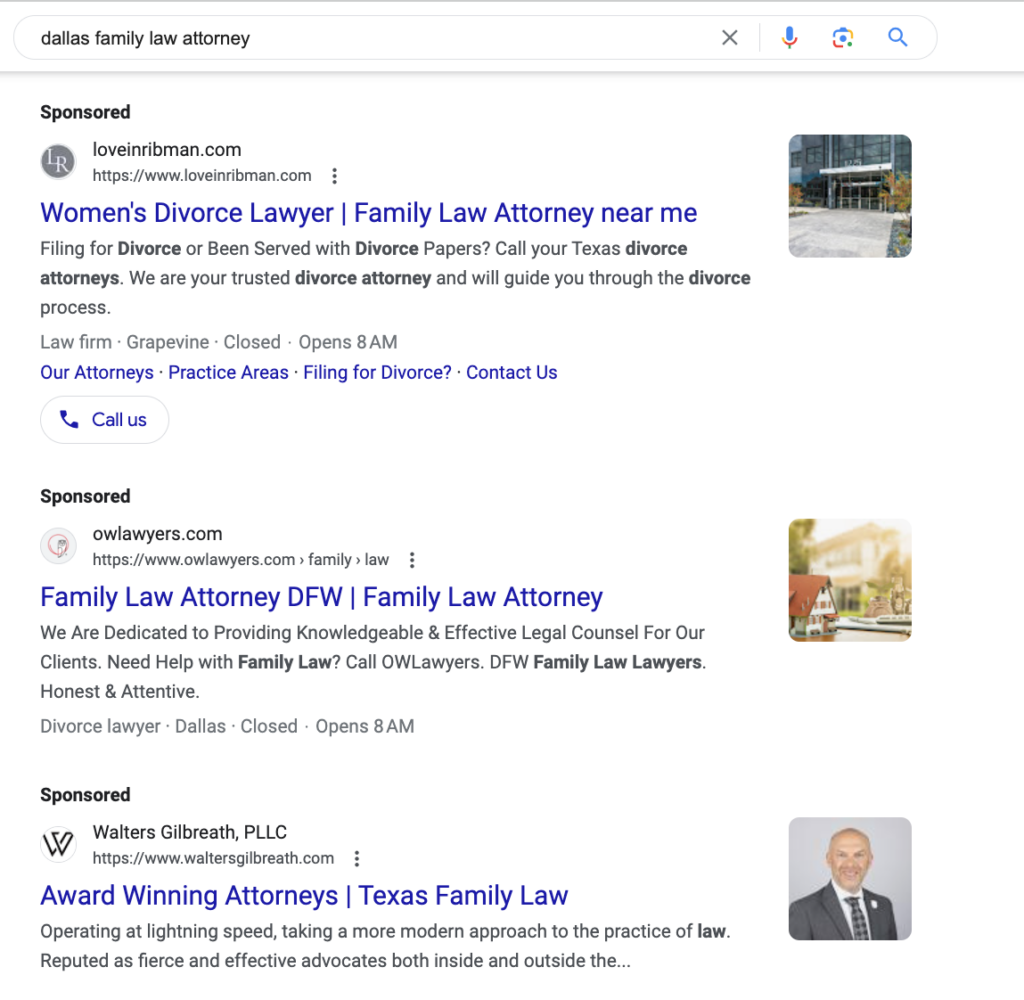Even to seasoned digital marketers, search engine optimization (SEO) can feel a bit like alchemy.
We can all see the tantalizing benefits: boosting your Google search rankings, attracting more relevant online leads, and watching our ROI skyrocket as we pump out a killer PPC ad campaign fueled by the right magic words. But the process of SEO is never-ending—just when you think you’ve struck gold, a tweak to the Google algorithms can leave you right back where you started. It’s exciting. It’s frustrating.
It’s SEO, baby!
While much attention is paid to selecting the right keywords—terms and phrases intended to attract search engines to your site—there’s another, often overlooked element that can significantly refine and improve your SEO strategy: negative keywords. Think of them as keywords’ evil twins, except they’re not really evil—they can be just as helpful to your campaigns’ success! For attorneys and law firm marketing specialists aiming to enhance their PPC campaigns to boost traffic and enhance SEO, understanding the role of negative keywords for law firms is crucial. Let’s dig into why.
What Are Negative Keywords?
Before delving into why you should use negative keywords, you need to understand what they are. Negative keywords are words or phrases that you can specifically exclude from your paid search campaigns (like Google Ads) to prevent your ads from appearing in search results for those terms. This targeting tactic helps ensure that your ads are not shown to users making irrelevant queries, thus saving you from wasting precious budget on ineffective clicks and improving the quality of your traffic.

Why Use Negative Keywords?
The primary benefit of implementing negative keywords for law firms in your SEO strategy is improved campaign relevancy and efficiency. By filtering out unrelated search queries, you can focus your advertising efforts on the audience genuinely interested in the legal services you offer, thereby increasing the chances of conversion. This practice not only enhances the ROI of your paid search campaigns but also contributes to a better overall user experience—a factor that search engines consider when ranking your website. That’s SEO!
Examples of Negative Keywords for Law Firms
To better grasp how negative keywords work, consider these examples relevant to law firms:
- Practice areas. If your firm specializes in personal injury law, you might want to add negative keywords for practice areas you don’t cover, like “estate planning” or “business law.”
- Screening words. You may also want to exclude terms that indicate a searcher is not in a hiring phase, such as “DIY will template” or “free legal advice.”
Identifying the right negative keywords starts with understanding your target audience and their search behaviors, as well as having clear insights into what your law firm offers and what it doesn’t. After all, we’re paying for every click here. The idea is to attract the clicks that will turn into clients and weed out the clicks that won’t.
What Is Negative Keyword Targeting?
Negative keyword targeting is the strategic practice of identifying and implementing negative keywords in your PPC and SEO campaigns. This approach requires continuous analysis and refinement—as in, forever. But by regularly reviewing your campaign’s performance and search terms reports, you can identify irrelevant terms that trigger your ads and add them to your negative keyword list. This ongoing process helps optimize your ad spend and ensure that your ads reach the most relevant audience.
How to Identify Negative Keywords That Would Be Beneficial to Your Campaign
Identifying effective negative keywords for your law firm’s campaigns involves a targeted approach. Focus on eliminating irrelevant traffic to improve efficiency and reduce costs. Begin with comprehensive keyword research, using tools like Ahrefs, to find terms related but not relevant to your services. Analyze your Google Ads Search Terms Report to identify the precise queries triggering your ads, highlighting mismatched user intent.

Understanding user intent is pivotal. At its core, user intent refers to the underlying purpose or expectation behind a user’s search query. It’s about deciphering what users are truly seeking—whether they want to buy a product, find specific information, or simply navigate to a particular site. By effectively interpreting user intent, marketers can tailor their ad campaigns to match these expectations, thereby enhancing the relevance and appeal of their ads.
Incorporating negative keywords into your campaigns is a direct application of understanding user intent. Negative keywords help prevent ads from being triggered by searches that are not relevant to the services or products offered.
The way forward: exclude terms indicating searchers are looking for free information or services unrelated to what your firm offers, such as “free,” “DIY,” or “jobs.” Also, consider competitor keywords to identify what might be irrelevant to your campaign, and use negative keyword tools for additional insights.
Regularly review and refine your list based on campaign performance and evolving search trends. By adding general irrelevant terms and specific mismatches identified through analysis (e.g., “real estate” for an intellectual-property-focused law firm), you enhance campaign relevance and targeting precision. This ongoing optimization process ensures you’re attracting the right kind of traffic—potential clients genuinely interested in your legal services.
How to Add Negative Keywords in Google Ads
Adding negative keywords to your Google Ads campaigns is a straightforward process that can give your law firm’s online marketing strategy a sharp edge. Here’s a negative keyword step-by-step guide:
- Sign into your Google Ads account
- Select the campaign or ad group to which you want to add negative keywords
- Click on “Keywords” and then “Negative Keywords,”
- Click the plus button to add new negative keywords
- Add negative keywords at the campaign level (to affect all ad groups) or ad group level (to affect only a specific ad group)
- Enter the negative keywords you’ve identified based on your strategy, and
- Select “Save”
Remember, it’s important to format your negative keywords correctly based on whether you want to exclude exact matches, phrase matches, or broader matches. Luckily, Google provides guidance on formatting for different match types.
How It Works
Imagine a law firm that does family law but keeps getting clicks from searches related to criminal defense law. This leads to unnecessary ad spend and poor conversion rates. By adding “criminal defense” as a negative keyword, the firm can prevent its ads from showing up in unrelated searches. This ensures that the ad budget is targeted toward the most relevant audience and increasing the likelihood of attracting potential clients genuinely interested in family law services.
Because life isn’t fair, one negative keyword probably won’t cut it! Remember, this is an ongoing process. Review your PPC and Google Analytics results regularly to find new negative keywords that can weed out the visitors to your website who are unlikely to find what they’re looking for.
I have been following Juris Digital for years on social media and reading all blog materials to better understand the brand. Juris has an impeccable reputation for results and performance. Our firm needed a leader in the industry to showcase the firm and have a create/result mentality.
— Attorney Jay Rooth
Get Help from the SEO Pros
Incorporating negative keywords into your law firm’s SEO strategy is essential for maximizing the effectiveness of your online marketing efforts. By refining your target audience and ensuring that your ads appear only for the most relevant queries, you can significantly improve your campaign’s performance, decrease wasted ad spend, and increase your legal practice’s online visibility. There’s just one catch: It’s work, and it never ends.
Fortunately, you don’t have to go it alone if you don’t want to. At Juris Digital, we specialize in providing law firms with exceptional SEO services, including the strategic use of negative keywords. Our in-depth understanding of the legal industry allows us to tailor our marketing strategies to meet the unique needs of your firm. By meticulously managing your negative keywords, we can help ensure that your advertising budget is focused on interested, relevant traffic that converts to actual clients. When you choose Juris Digital, your firm will benefit from our commitment to driving growth, enhancing your online presence, and maximizing ROI in the competitive legal market. Contact us today to get a quote on your SEO needs!
